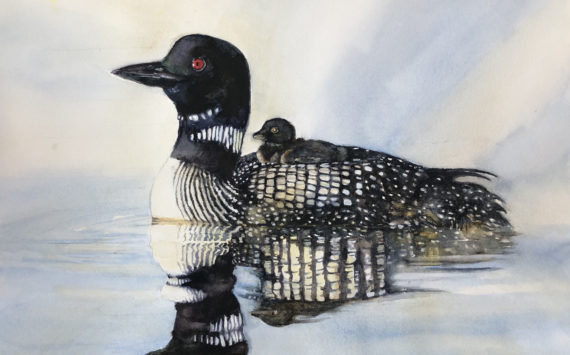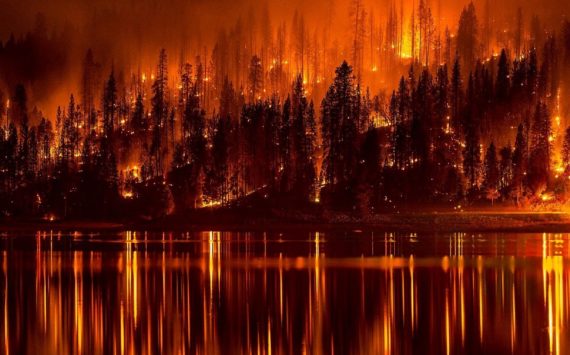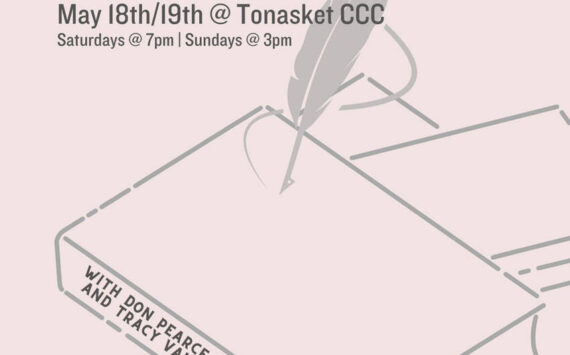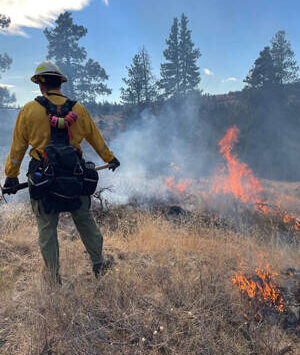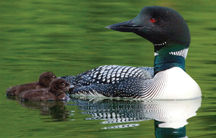

The common loon of Washington State will be the topic of the Highlands Wonders presentation by Daniel and Virginia Poleschook at the Tonasket Community Cultural Center the first Friday in May. Photo courtesy of Daniel and Virginia Poleschook
TONASKET – Okanogan Highlands Alliance (OHA) announces an opportunity on May 6th, 2011 to absorb the beauty and ingenuity of Washington loons, as Daniel and Virginia Poleschook share from their observations, research and conservation work in the Okanogan Highlands region. They will discuss ways in which the public can support this remarkable and sensitive waterbird, including the importance of using lead-free fishing tackle.
Daniel and Virginia (Ginger) have been nature photographers since the early 1970’s. From 1996 to the present they have specialized in capturing images of common loons and other waterbirds, while conducting conservation work on common loons in the Pacific Northwest, as Research and Education Coordinators for the Loon Lake Loon Association and Adjunct Field Scientists for the Biodiversity Research Institute. They have given hundreds of nature-photography and conservation presentations to a vast number of individuals, organizations and wildlife managers throughout the United States, Canada, Africa and Costa Rica. They have written a series of reports for the U.S. Forest Service and the Washington Department of Fish and Wildlife. Daniel and Virginia were awarded the “2010 Educators of the Year” by the state Department of Fish and Wildlife. Since April 2010, they have been working on Gulf of Mexico bird species damage assessment.
“Our research into the mortality of common loons led to the knowledge that lead toxicosis is the leading cause of death,” said Daniel Poleschook. “All of these lead-related deaths were from lead fishing tackle.”
With that knowledge, and from other research they have done, Daniel and Virginia made a recommendation to the WDFW Fishing and Wildlife Commission to ban the use of lead fishing tackle in all Washington waters. The recommendation was reduced to include only the 13 present common loon nesting lakes and passed in Washington legislature on Dec. 6, 2010.
“We are pleased for that,” Daniel adds, “but it does not protect loons and all other waterbirds throughout the State.”
The Highland Wonders educational series features the natural history of the Okanogan Highlands and surrounding areas. The May 2011 Highland Wonders event marks the end of the first season of indoor presentations. From June to September, Highland Wonders will transform to an outdoor interpretive program aimed for smaller groups. OHA’s Education Program is designed to build the capacity of the community to steward wetland and water resources, by helping to develop an informed and empowered population.
The indoor educational series is offered by Okanogan Highlands Alliance, free of charge, as part of the Community Cultural Center (CCC) of Tonasket Friday coffeehouse. Dinner benefiting the CCC begins at 5 p.m., and the presentation begins at 6:30 p.m. with desserts, tea and coffee. The events are held at the CCC, at 411 S Western Avenue, Tonasket and details are provided on OHA’s website: www.okanoganhighlands.org/education.
OHA is a non-profit that works to educate the public on watershed issues. For more information, community members can email julie@okanoganhighlands.org or call (509) 433-7893. The public can provide input on the topics addressed by OHA’s education program by filling out the following survey: www.surveymonkey.com/s/T7H3SGX.

